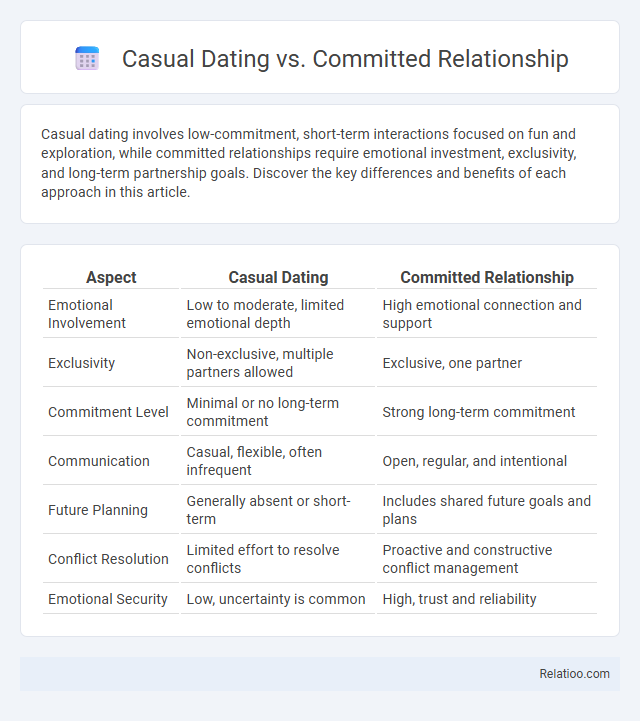Casual dating involves low-commitment, short-term interactions focused on fun and exploration, while committed relationships require emotional investment, exclusivity, and long-term partnership goals. Discover the key differences and benefits of each approach in this article.
Table of Comparison
| Aspect | Casual Dating | Committed Relationship |
|---|---|---|
| Emotional Involvement | Low to moderate, limited emotional depth | High emotional connection and support |
| Exclusivity | Non-exclusive, multiple partners allowed | Exclusive, one partner |
| Commitment Level | Minimal or no long-term commitment | Strong long-term commitment |
| Communication | Casual, flexible, often infrequent | Open, regular, and intentional |
| Future Planning | Generally absent or short-term | Includes shared future goals and plans |
| Conflict Resolution | Limited effort to resolve conflicts | Proactive and constructive conflict management |
| Emotional Security | Low, uncertainty is common | High, trust and reliability |
Understanding Casual Dating: Definition and Key Features
Casual dating involves non-exclusive interactions where individuals enjoy companionship without the expectations of long-term commitment or exclusivity. Key features include flexibility, minimal emotional investment, and open communication about intentions to avoid misunderstandings. Your approach to casual dating should prioritize clarity and mutual respect to ensure a positive experience without pressure for a deeper commitment.
What is a Committed Relationship? Essential Characteristics
A committed relationship involves mutual agreement between partners to maintain loyalty, emotional support, and long-term dedication. Essential characteristics include trust, open communication, exclusivity, and a shared vision for the future. Unlike casual dating, committed relationships prioritize stability, partnership growth, and deeper emotional connection.
Emotional Expectations: Casual Dating vs Committed Relationship
Casual dating often involves low emotional expectations, allowing you to explore connections without the pressure of deep attachment or future planning. Committed relationships require higher emotional investment, fostering trust, vulnerability, and long-term support between partners. Understanding these differences helps you manage your feelings and communicate your needs effectively in any romantic dynamic.
Communication Styles in Both Relationship Types
Communication styles in casual dating often prioritize light, flexible conversations with less emotional depth, focusing on mutual enjoyment without long-term expectations. In committed relationships, communication is deeper and more consistent, emphasizing transparency, emotional support, and future planning to maintain trust and intimacy. Exclusivity requires clear, direct communication about boundaries and expectations, ensuring both partners understand the commitment level and reduce misunderstandings.
Navigating Boundaries: Setting Limits and Agreements
Navigating boundaries in casual dating requires clear communication about expectations and limits to prevent misunderstandings and emotional confusion. In committed relationships, setting mutually agreed-upon boundaries fosters trust, respect, and emotional security, enhancing long-term stability. Exclusivity involves explicit agreements on fidelity and shared priorities, ensuring both partners align on relationship goals and avoid conflicts related to outside interactions.
Intimacy Levels: Physical and Emotional Connections Compared
Casual dating often involves lower levels of emotional intimacy, focusing primarily on physical attraction and short-term interactions, while committed relationships foster deeper emotional bonds alongside regular physical connection. Exclusivity enhances both physical and emotional intimacy by ensuring mutual trust and ongoing commitment, allowing partners to develop a stronger, more secure bond. Understanding these differences helps you navigate your personal needs and expectations for intimacy in any type of relationship.
Impact on Personal Growth and Independence
Casual dating encourages exploration and self-discovery, allowing individuals to maintain personal freedom and prioritize individual goals without the constraints of commitment. Committed relationships foster emotional growth through shared experiences, mutual support, and long-term goal alignment, often requiring compromise that can strengthen personal resilience and empathy. Exclusivity balances independence and connection by creating a secure environment for trust-building while preserving autonomy, promoting a healthy blend of personal identity and relational growth.
Common Challenges in Each Relationship Style
Casual dating often faces challenges such as misaligned expectations and lack of clear communication, leading to potential misunderstandings about the relationship's nature. Committed relationships frequently encounter difficulties with balancing personal freedom and partnership responsibilities, which can cause stress and conflict between partners. Exclusivity requires strong trust and consistent emotional investment, where jealousy and insecurity may arise if boundaries and commitment levels are not openly discussed.
Choosing What’s Right for You: Factors to Consider
Choosing between casual dating, a committed relationship, or exclusivity depends on your emotional needs, lifestyle, and long-term goals. Casual dating offers flexibility and low pressure, while committed relationships require emotional investment and shared future plans. Evaluating your readiness for exclusivity involves understanding your desire for trust, stability, and deep connection with a partner.
Future Outlook: Transitioning Between Casual and Committed Relationships
Transitioning between casual dating and committed relationships requires clear communication and mutual understanding to align expectations and emotional readiness. Your ability to recognize signs of deeper connection and willingness to invest in exclusivity play crucial roles in this evolution. Future outlooks improve when both partners prioritize trust and openness to navigate changes in relationship dynamics effectively.

Infographic: Casual Dating vs Committed Relationship
 relatioo.com
relatioo.com